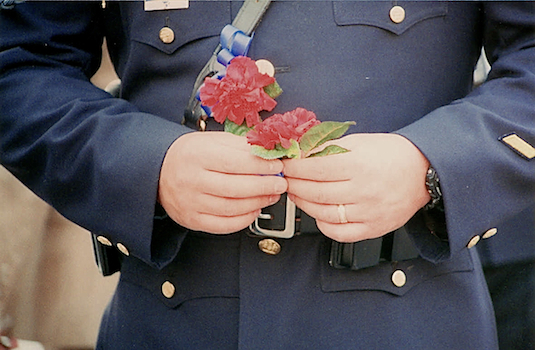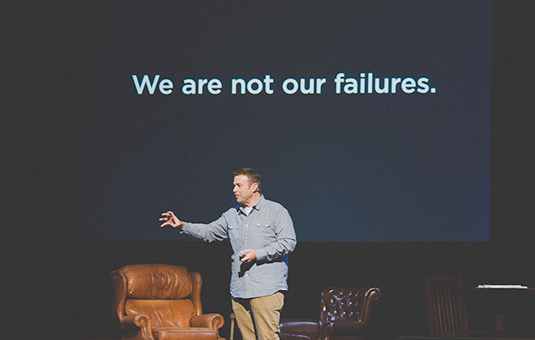Donald Miller's Blog, page 78
December 14, 2013
The Best Viral Videos We Found This Week
Last week, the Christopher Maloney video won the majority vote. What about this week? Vote for your favorite below in the comments.
The Best Viral Videos We Found This Week is a post from: Storyline Blog
December 12, 2013
Restoring Broken Places This Christmas Season
Last week, Icelandic police shot a man.
This hardly seems newsworthy, except, it was the first event of its kind in the history of Iceland. Never before had police killed anyone. Ever.
When the two officers responded to the call and went into the suspect’s house, they were unarmed.
In Iceland this is not unusual; the majority of the Icelandic Police officers don’t carry weapons.
After the event was over and the man was dead, the police officers grieved.
They mourned and regretted the incident and went on to even express sympathy and pay respects to the man’s family. The officers were deeply disturbed and are currently in counseling.

*Photo by Elvert Barnes
This is a far cry from the places we have witnessed and seen on the news: situations where people have used remote devices to dismember and kill marathon runners, the tragedy of an elementary school shooting. Our news is filled with broken places.
This week Iceland gives me hope.
Iceland sounds suspiciously like the land we hope for— one that has come and gone and is, one day, coming again. This is the Everlasting Place where “lion and the lamb lay down together.” In this coming Kingdom, dreams are as bright as the noonday sun reflecting off the snow. People will be cherished and seen, loved, valued and enveloped in a canopy of peace.
This Advent Season, I pray you can approach family and friends open and unarmed. May you see people with eternal eyes, divinely unique and immeasurably valuable, as you hope for the Place that has passed and is coming again. This is the hope found even in the darkness of the Icelandic tragedy. This is the hope of Christmas – a Child has come to restore and renew our broken places.
Restoring Broken Places This Christmas Season is a post from: Storyline Blog
The Single Most Powerful Question You Can Ask
When novelists sit down to write a narrative, there is a question they ask themselves in order to create exciting and meaningful stories, and that same question can also create a more exciting and meaningful life. That question is: “What if?”
J.R.R. Tolkien once asked the question “What if” there existed a place called Middle Earth, and “What if” Middle Earth were under threat? Every good story begins with some form of this question, and so does every life.
Whenever a novel starts to drag, the writer simply has to ask this question, and suddenly life gets exciting again.
“What if” there were a car accident, “what if” my protagonist won the lottery, what if my protagonist came home and his wife had left with all the furniture? A series of these questions will dislodge whatever fascinating thing is going to happen next in the story.
Now to be sure, you don’t have the power to win the lottery and I don’t recommend getting in a car wreck, but within limits, the question What if? can radically change our story and our lives.

Photo by Ken Bosma, Creative Commons
Several years ago, I asked the question, “What if the 360,000 churches in America could each have a mentoring program”, and out of that question came one of the most exciting adventures in my life, The Mentoring Project.
Bill Hybles once asked “What if” there were a church in this field? Rick Warren asked “What if” we could bring peace to the continent of Africa? Out of these questions came stories that have positively affected millions.
“What if” you asked yourself a series of these questions? “What if” you got out a yellow pad and wrote down a few story turns that you could engage? “What if” you ran a marathon? “What if” you renewed your marriage vows? “What if” you quit your job? “What if” you brought home a puppy today? “What if” you and your family adopted a child?
If your story has gotten boring, perhaps it’s time to ask yourself the “what if” question.
Try this, in the comment box, just brainstorm five what if questions as fast as you can. Try to to take the suggestion seriously, but do it fast. What will begin to happen is you’ll begin to dream, you’ll stop thinking of life as stagnant, and you’ll be reminded that life, for the most part, is what you make of it.
The Single Most Powerful Question You Can Ask is a post from: Storyline Blog
December 10, 2013
How A Homeless Man Taught Me About Heaven
Not long ago, a good friend of mine called me. A friend of his had gotten into trouble, and was now in a halfway house in Nashville. He asked if I would visit him, and maybe take him a toothbrush and some underwear. I agreed and made my way there one evening.
When I got there, I sat with my friend’s friend on the back deck of the halfway house and talked about how he ended up there. As we talked, another man came out on the deck, lighting up his cigarette as he sat down. There was a weathered look about him. He had dark, leathery skin, and looked like he had endured the sun, the rain, and the wind for long, long time. I couldn’t tell how old he was, but I was sure that he was younger than he looked.

Photo by Jamesy Pena, Creative Commons
Through a bit of conversation, I found out that he had been on the streets for many, many years. And he was at the halfway house because he wanted to see if he could dry out and come off the streets. He told me that being inside made him nervous and he liked to stay out on the deck as long as he could at night. He felt safe under the familiar stars, and claustrophobic and nervous in his new bedroom.
Without my asking, he launched into describing life as a homeless man.
How he got food; how he stayed warm; how he got money. And then he told me something that caught my attention.
He said, “Ya want to know how I keep my stuff safe at night?”
“Sure,” I replied.
“I put it up in the trees.”
“Why is it safe in the trees?” I asked.
“Homeless guys are always looking for treasure on the ground,” he said. “We never look up.”
“Could you say that again?” I asked, knowing that something profound had just been uttered.
“The homeless are always looking for treasure on the ground – coins, something someone’s dropped, half-smoked cigarettes. I know if I put my stuff in trees, they’ll never find it because they never look up. Never.”
Profound words from an unexpected place. And his message is for all of us.
You and I are always hunting for treasure, aren’t we?
We’re looking for treasure on this earth, in the next big thing, in the perfect relationship, or in that deal that will finally help us achieve financial stability (or the illusion of it). We all have our particular search. But what we are REALLY looking for is right there above us. In fact, it’s surrounding us.
Perhaps this Advent season, we will take the time to avert our eyes to the heavens – to a star shining brightly – announcing good news, great joy, and abundant treasure.
There’s really nothing we need on the ground.
How A Homeless Man Taught Me About Heaven is a post from: Storyline Blog
December 9, 2013
How I’ve Taught People To Treat Me Differently
I’ve heard it said that you can teach people how to treat you, but until recently I never really understood how that worked. One day it hit me. I used to be a teacher. In fact, I have a graduate degree in education. I taught middle school and high school for a few years. If I wanted to teach people to treat me differently, I had all the strategy I needed.
How do you teach people how to treat you differently? The same way you teach anybody, anything.
First, you have to know who you’re teaching.
In my graduate level Education program, we talked about this more than any other subject. We took whole classes to understand stages of development. We talked about different learning styles and intelligences and conducted “pre-assessments” to determine what the students already knew before we began.
The main point was this: you had to know who you were teaching, or the student wouldn’t learn.

*Photo by Don Debold, Creative Commons
When it comes to teaching people how to treat me, I think this is where I most often go wrong. Usually I am trying so hard to be understood myself — to get my “lesson” across, so to speak — I forget that, first, I must seek to understand the other person.
I need to know what motivates them, what frustrates them, and what they’re capable of learning and doing. Without this, I’ll ask them to do things they can’t do, hold them to impossible standards, and make dangerous assumptions about their intentions. The result will be chaos, not teaching.
Give concrete examples.
In the teaching profession, we used a word for this called scaffolding, which is a term borrowed from construction. Scaffolding is a temporary structure used for holding workers and materials during the construction of a building. In teaching, scaffolding is the structure we use to prop students up while they’re learning.
So, for example, if you were teaching Algebra, you would scaffold the learning by doing a few sample problems on the board, before allowing the students to work on their own. Teaching without scaffolding would be like asking the students to teach Algebra to themselves.
It’s ridiculous, and yet this is so often the approach I use when teaching others how to treat me. I pout and withdraw (or get angry and throw verbal punches) when someone does something I don’t like, but expect them to figure out the lesson for themselves, without any specific examples or instruction.
Then, I’m angry when they fail the test.
What if I was just specific and intentional? What if I just said, “When you change the plan at the last minute, it makes me feel like you don’t value my time or schedule. In the future, it would make me me feel more honored if you would make a plan ahead of time and stick with it.”
Stay calm.
Every teacher knows: If you raise your voice, or speak harshly or aggressively to a student — at all — you lose their attention. Even if you’re right, even if their grade depends on your correction.
If you yell, or speak in anger, the student won’t listen.
This is just as true when I’m teaching others to treat me differently. The minute I lose control of my emotions, I prove my efforts are really more about self-protection, self-promotion and self-glory than they are about discovering a more mature, constructive life-giving way to communicate and live.
Focus on one thing at a time.
When teaching, it’s best to focus on one concept at a time, or students get overwhelmed and give up. In fact, there has been quite a bit of research done to pinpoint just how long a student can pay focused attention to a lecture at the front of a class.
As a teacher, this means you choose wisely what you teach today, what you leave for next time, and what you abandon altogether.
The parallel here seems obvious to me, but what kind of teacher would I be if I didn’t point it out clearly? Choose your battles. We want others to treat us differently, but start with the most destructive habits, patterns and language first. Pray for grace to respond well to the others until they can change as well.
Evaluate for progress.
When a student is able to understand and implement the concepts you’ve taught, they get to move on to the next grade level. If they don’t, they’re held back. Nobody likes holding a student back. Nobody. But it’s absolutely necessary to make sure they succeed in the future.
This is not punishment for the student. In fact, just the opposite. It comes from a place of protection and deep care.
Think of the people in your life you would like to treat you differently. Have you confronted a specific behavior multiple times, but it hasn’t changed? You have to ask yourself: why?
Is it because the student refuses to learn?
Is the student not applying himself/herself?
Is there a developmental problem that prevents the student from succeeding?
Have you failed to do your part, as a teacher?
The answers to all these questions help you figure out how to make the difficult, but necessary, decisions you must make next: You must either hold the student back (from certain areas of your heart or life) until the behavior meets the most basic standard, or choose to reevaluate, and re-approach until the lesson is learned.
How I’ve Taught People To Treat Me Differently is a post from: Storyline Blog
Why The Storyline Conference is “Pay What You Want”
I’ll admit I’m not one to believe I’m hearing from God very often, at least not in a specific sense. But there have been a few times when I’ve felt an urge or “call” from God to move a certain direction. Usually, whatever it is, feels a bit crazy.
Last year, while we were considering raising prices for the Storyline Conference, I felt like God was telling me to make the conference accessible to more, not less people by allowing people to pay what they wanted.
It didn’t seem logical or reasonable at the time. It wouldn’t make sense in a math equation or on a pie chart. But if I’ve learned anything from God asking me to do crazy things, its when I choose to step out in faith, good things happen.
This is the upside-down nature of the Kingdom of God.
So we did it. And it worked.

*Photo by Daniel Robinson
Our Nashville conference sold out and amazingly it was actually financially sustainable! And not only this but it was a larger and more diverse crowd than we’d ever had. The room felt electric and by the end we’d hosted our best conference ever.
We loved the experience so much we are doing it again.
Literally, if you go to the Storyline Conference registration page, you can charge your credit card for an amount that seems right for you and you’re registered. Just like everybody else, you get the Conference Workbook, small group guides and even free coffee and snacks.
We’re really doing it again and we couldn’t be more excited.
If you’ve not experienced The Storyline Conference, join us this February. You’ll leave with a completely remodeled perspective on your life, and you’ll likely leave with a lot more friends.
There are a few bonuses if you pay the recommended price, because that helps others who can’t afford it. But anybody can truly participate at any price.
At Storyline, you’ll:
Hear me and about five other guest speakers talk about telling a meaningful story in your faith, family and career.
Gain an incredible sense of clarity about what you want to do with the rest of your life.
Meet inspiring people who’ve come from all over the country.
Laugh. A lot.
Complete an entire workbook of interactive exercises that will help you get out of any rut you’re in.
Learn to redeem any hard experience you’ve gone through so it no longer holds you up.
Be reminded that the God who loves you is still interacting with you and wants your story to be meaningful.
…and we’ve got a few surprises planned, too.
The reviews so far have been incredible. We hope you can make it. Register today!
Why The Storyline Conference is “Pay What You Want” is a post from: Storyline Blog
December 8, 2013
Sunday Morning Sermon – It Ain’t Over
Imagine doctors tell you that you have only two to five years to live. Many of us would respond exactly how Ed initially responded to this unfortunate news — he wanted to give up. But thanks to a call from an unlikely friend, Ed decided his life was worth living, no matter the time frame or difficulties he may face.
I had the opportunity to hear Ed speak just over two years ago at a conference in Chicago, and when I heard his perspective, I couldn’t help but feel moved to take advantage of every day, week, and year I am privileged to be alive. Life is precious, and we never know when it will end.
No matter what you are facing this season, I hope Ed’s story inspires you to show up. People need to hear what you have to say.
Sunday Morning Sermon – It Ain’t Over is a post from: Storyline Blog
December 7, 2013
The Best Viral Videos We Found This Week
The courageous story of John Shear won the community vote last week. What about this week? Vote for your favorite below in the comments.
The Best Viral Videos We Found This Week is a post from: Storyline Blog
December 6, 2013
This Is How Ordinary People Change The World
Largely unnoticed in European history books is the tiny French village of Le Chambon. Mountainous, impoverished, and easily overlooked, the small town of Le Chambon represents a miracle of compassion.
During the four years of the German occupation of France in the 1940’s, this sleepy town assisted nearly five thousand Jews, most of them children, to navigate Nazi-occupied France into neutral Switzerland. Under the leadership of a local minister named Andre Trocme, hundreds of ordinary Chambonnais risked certain death to rescue, house, and forge identities for the Jewish refugees of World War II.
History books tell us it is great men and great armies who make history.
Compared to the military operations of WWII, the story of Le Chambon is a small one. In a world where moral action is often deemed worthy by its impact on the greatest number of people, ordinary individuals affecting the lives of few are easily overlooked.
With nearly 70 million lives lost in World War II, a few French eccentrics in Le Chambon did virtually nothing to stop Hitler’s war machine and death camps.
Their mountainous village was a blip on the map, a tiny irrelevant drop in the bottomless ocean of war.

*Photo by Pascal Blanchot, Creative Commons
But in the secret rooms and converted attic spaces in Le Chambon, the actions of a Protestant minister and a few dozen allies were far from insignificant.
They believed that God acts in stealth ways, under the radar, and so should they also.
They believed that Christian compassion is tangible verb of purpose, a fog of goodness filtering under doorframes and through air conditioning vents, wafting beneath kitchen tables, and settling in the floorboards of newly painted safe rooms.
The Chambonnais believed each individual life saved was one step closer to the end of the war and the eventual redemption of humanity. They were ordinary citizens, motivated by the preciousness of each human life, acting in the present for the right purpose. Or what Dr Martin Luther King Jr. has famously dubbed, “The fierce urgency of now.”
The actions in Le Chambon were carried out, not by City Hall or the Red Cross but by individual citizens in the privacy of their homes, led by both men and women alike. In their daily decisions of courage, mostly at their kitchen tables and in groups of few, the Chambonnais brought the most pressing needs of the world into their living rooms. Andre Trochme’s wife, Magda even considered their actions a “hobby” for her and her friends as they skillfully colluded with church members and neighbors to shuttle and transport Jews around Le Chambon and into Switzerland.
In the 1970’s an American named Phillip Hallie spent a few months in Le Chambon conducting research for a book he would later write called Lest Innocent Blood Be Shed. Hallie interviewed surviving leaders about their experiences, and specifically on the nature of “goodness” in their rescuing of Jews. In almost every interview Hallie had with the Chambonnais, they were put off by the moral complexity of his questioning and as to why he was exploring the topic of “goodness.”
Hallie writes there came a moment when nearly every interviewee would pull back and looked firmly into his eyes. One after another, they responded with,
“How can you call us ‘good’? We were doing what had to be done. Who else could help them? And what has all this to do with goodness? Things had to be done, that’s all, and we happened to be there to do them. You must understand that it was the most natural thing in the world to help these people.”
For the Chambonnais, the question of Nazism wasn’t how could God allow such evil to occur, but how does God work through ordinary people to combat such evil.
Rather than over-theologizing and over-analyzing, the Chambonais jumped in headfirst. They didn’t wait for a conference on starting a movement or hold out for a shiny diploma to hang on an office wall. Guided by true feelings of empathy, they met in their one room church, trained themselves, and changed the world.
As modern people looking back on history, we have the unique ability to romanticize and deify its dissidents into super-human saints, immortalized in stained glass.
The courage of the Chambonnais seems almost Marvel Comic worthy, existing in a time and place outside the human experience. And as we face the most pressing challenges of our time, it’s easy to wish for the likes of William Wilberforce, Rosa Parks, and Mahatma Gandhi. If somehow we could resurrect them from martyrdom, melt down the statues, snip out the date on the calendar in their honor, and bring them back to lead the charge for justice, equality, and sanity.
But like the ordinary citizens of Le Chambon in the 1940’s, it is us who are called to these troubling times. Not Thomas Jefferson or Harriet Tubman. Frederick Douglass or Mother Theresa. It is us whom God has chosen for today.
This Is How Ordinary People Change The World is a post from: Storyline Blog
December 5, 2013
How to Love and be Loved
This week my master, Don, is on his honeymoon with his new wife. He asked me if I would take over his blog today, and since I am a man’s best friend, I agreed. In the spirit of marriage, weddings and love I thought I would share about how I learned to love and be loved.
It’s simple really. I pretty much like everybody. I don’t like them instantly, though, but if they show the slightest bit of niceness I like them immediately after and I like them a lot. When somebody first comes to the door I bark at them to let them know this is where we live. I set very clear boundaries. And then I get so excited to see them and be with them I just about explode.

*Photo by Darrell Vesterfelt
When my bladder was smaller I would just pee right there on the floor. I peed because I was very excited and also to show that I would be submissive and I wasn’t going to threaten them. Not all dogs are as trusting, but that’s another subject.
Here’s the thing about people, though. Not everybody is going to like you back.
But that’s okay. You shouldn’t hardly think about that at all. A dog can only take so much love. I have more than I even know what to do with. Here’s how I got it:
1. I am genuinely excited about seeing and being with people. Seriously, if you are excited about people, you improve the chances of them being excited about you. It’s best to genuinely love them and want to be with them and enjoy their smells. One of the differences between people and dogs is that people can fake whether they want to be around somebody but dog’s cant. People like dogs because dogs are genuine. But people can be genuine too if they practice and they learn to trust and forgive.
2. I don’t get bitter when somebody doesn’t like me. If somebody doesn’t want to pet me, I could care less. I will be very nice to them and excited to see them all the same. I don’t take it personally at all. Remember, there’s plenty of love to go around. The cool thing about dogs is we really don’t care who loves us. I don’t place the value of one persons love higher or lower than another’s, except for my master. If you show partiality, you are going to have a very hard time loving and being loved and you’re going to be miserable. It’s a sad thing about humans that they want people to love them who just don’t, and they don’t accept love from the people who really do love them in the first place.
3. I know my place. I know that I am just a dog, so I don’t get all up on people too much. Okay, I do it a little too much, but not too much too much. If you liked people as much as I liked people, you’d want to stand on them while they were sitting on the couch drinking coffee too. I seriously love people. But I also know that any creature can feel like a burden if they don’t have self esteem and the ability to be okay with just themselves, laying on the dog bed, for a little while. You can still watch them from the dog bed. They are so awesome. I love them.
4. I avoid people who hurt me. If somebody is mean to me, I will remember it forever. I will associate that person with a mean time. I don’t hold it against them, but I don’t get too close to them. In fact, I’d just prefer it if they weren’t around. But I certainly don’t sit around thinking how I’d like to hurt them. When they are gone, they are gone. My life is really good in this way, and I think it’s sad that some dogs have to be with people who hurt them. It’s sad for people in that situation, too. If they can get away and to a better place, I think they should. Or maybe they should try their hardest to talk it out. But if they keep getting hurt, they need to move on.
5. I don’t hold grudges. Sometimes you meet people who don’t love you. They may even not like you at all or want to be with you. With these people, I am just as nice. If they don’t want to be with me then they walk away. That’s their thing and I don’t take it personally. And if they ever come back and want to be friends, I am all in. Like I said, I don’t take it personally. The best way to be forgiving is just to wipe the slate clean and call it even as often as you can. Actually, though, that’s a human thing, because I don’t keep score. I just like people all the time.
6. I am loyal. I will never turn on a friend. Never. I understand going into it that I am going to love them more than they love me, and they won’t always be so loving, but that doesn’t matter. I can only control me, and I really like people and will never turn on them. Some dogs will but those aren’t good dogs.
There’s probably more but I want to go outside. Do you want to go swimming?
How to Love and be Loved is a post from: Storyline Blog
Donald Miller's Blog
- Donald Miller's profile
- 2745 followers



